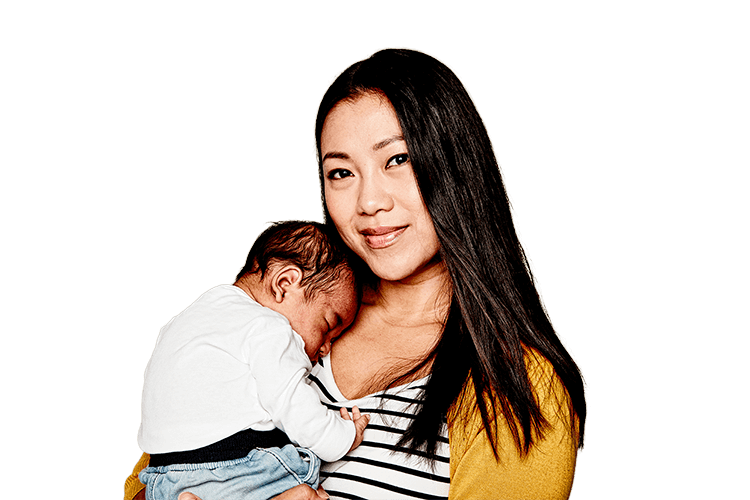Any couple who has tried unsuccessfully for many months, or years, to get pregnant will tell you how confronting, stressful and emotional this time can be. It can also be very confusing—you might be unsure about where to turn for advice, and what your options are.
Yet infertility is not uncommon, in fact around one in six Australian couples will have difficulty getting pregnant.

There are many possible causes of infertility, and it affects both men and women. For women, it might be problems with the fallopian tubes, cervix or uterus— or it might have something to do with your menstrual cycle or endometriosis. For men, it can be caused by problems with the sperm, impotence, or obstructions to the passage of sperm.
We explore some options on where to go for help, and explain some possible treatments.
When should seek help?
Depending on your age, it’s important that you don’t wait too long to seek advice. IVF Australia recommends that couples under the age of 35, who have been trying for 12 months or more should seek advice from a fertility specialist. Couples over the age of 35 are advised to seek advice after 6 months, as fertility declines significantly in your late 30s.
Lifestyle factors that can affect fertility
Age
There are many lifestyle factors that can affect your ability to conceive, but evidence suggests that the age of both the man and woman plays the most important role. It is commonly reported that a women’s fertility declines dramatically at 35, and although it is often beyond our control, some studies suggest that women should try to get pregnant before the age of 30 and men before 35 for the highest chances of success.
Weight
The weight of the both the woman and man can affect your chances of getting pregnant. Research shows being overweight – especially significantly so – can affect your chances of conceiving and having a healthy baby. But being underweight can also affect a woman’s fertility, causing hormone imbalances that affect ovulation and therefore make it harder to get pregnant.
Stress
Stress may also reduce a woman's chance of becoming pregnant. One study found an association between high levels of a substance indicative of stress and a reduced chance of becoming pregnant. The researchers also noted that that stress may increase with the disappointment of several failed attempts at getting pregnant, setting off a cycle in which pregnancy becomes even more difficult to achieve. This suggests it’s important to look after yourself as much as possible while trying to conceive.
Lifestyle habits, diet and exercise
Research also shows other factors that may impact fertility include nutrition and exercise, smoking, recreational and prescription drug use and alcohol and caffeine consumption.
Where to go for help
Start with your GP. They can provide you with pre-conception advice and tests, and if you’ve been trying for a while without success, they may conduct some fertility tests.
Your GP can also help you with advice on making the appropriate adjustments to your lifestyle, and help you work out which days of the month you are most fertile, to give you the best chances of getting pregnant. There are also apps and information online which can help you work out your ‘fertility window’.
Your GP can also refer you to a fertility specialist for further testing and discussion around your treatment options. You may be referred to a private clinic or a public hospital.
What's next?
At your first appointment with a fertility specialist, you and your partner may be asked to provide a full fertility history. You may also undergo tests to assess your fertility reserve, ovulation status and normal function of your reproductive organs, the tubes, the uterus and the ovaries. A semen analysis will also be requested.
Getting Pregnant Treatment options
Following your initial consultation and testing, you will then work with the clinic to decide which treatment is most appropriate for you. A lifestyle assessment and weight management strategy might also be implemented. Possible treatment options include:
Ovulation Induction
Ovulation induction is one of the simplest and least invasive fertility treatments. It involves taking medication to induce ovulation by encouraging eggs to develop in the ovaries and be released, increasing the chance of getting pregnant through timed intercourse or artificial insemination. Ovulation induction is most suitable for women who are producing low levels of hormones for ovulation, or who are not ovulating at all but have normal fallopian tubes, and the male partner does not have any fertility problems.
IUI or IVF treatment
Intrauterine insemination (IUI) and in vitro fertilization (IVF) are two commonly used methods of fertility treatment.
Artificial insemination or intrauterine insemination involves inserting a male’s semen through the cervix and into the uterus, close to the time of ovulation. It is a simpler, less invasive form of fertility treatment.
In Vitro Fertilisation or IVF is a process where a woman’s eggs are fertilised with a man’s sperm outside of the body, and once they are fertilised, they are then transplanted into the woman’s body. Close to one in 30 babies in Australia are conceived with IVF. You can read more about IVF here.
Freezing embryos
A frozen embryo transfer is a cycle where a frozen embryo from a previous fresh IVF cycle is thawed and transferred back into a woman's uterus. It means the woman doesn’t have to undergo another cycle of hormone stimulation and an egg collection frozen embryo cycles can be undertaken on your natural cycle or using ovulation induction. Read more on freezing embryos.
How much does fertility treatment cost?
The cost of your fertility depends on your individual treatment plan and if your health insurance includes cover for IVF. Medibank Gold Complete hospital cover pays benefits towards some of the costs of fertility treatment. Check with your clinic and Medibank before you get started and do your research to get an idea of costs you can expect from IVF. Remember waiting periods may apply on your cover.
Where to get support
Undergoing IVF treatment can be a difficult journey both physically and emotionally. It’s important to get support if you are struggling. You can chat to your GP, a psychologist or get counselling and free support from Access Australia.
Need a little extra support?
Health Concierge
Whether it’s taking you a little longer to fall pregnant than you expected, or you know you’ll be needing a bit of extra help, Medibank’s Health Concierge service is there to help. You can call 1800 789 414 for support and guidance, available at no extra cost for members with residential hospital cover#.
24/7 Medibank Nurse Support
Medibank health insurance members can chat to a registered nurse over the phone or online and get guidance on what they can do next. Chat online or call 1800 644 325 anytime of the day or night, 7 days a week at no extra cost.~
24/7 Medibank Mental Health Support
Medibank health insurance members can chat to a mental health professional over the phone or online about how they feel and get guidance on what they can do next. Chat online or call 1800 644 325 anytime of the day or night, 7 days a week at no extra cost.~
Optimal me
Medibank has partnered with Monash University to create OptimalMe, a research program designed to help mums-to-be optimise their health before they conceive. The program features tailored health and wellbeing tips and personal guidance on fitness and nutrition.
If you’re planning to have a baby in the next 12 months you may be eligible to take part. Find out more here
Looking for something else?
Visit Medibank Planning, Pregnancy and Parenting for a range of tools and advice to help you at every stage of your pregnancy journey.
Help the way you want it
Contact us
Call us on 134 190 to speak to a consultant. Alternatively, chat to us 24/7 online.
Self-service options
Login to MyMedibank or Download the MyMedibank App for self service options.
Find a specialist
Find a specialist or Member's choice hospital using our find a provider tool.

Things you should know
~ Some referred services may involve out of pocket costs and waiting periods may apply.
# Health Concierge is available to all eligible Medibank members who hold hospital cover. Excludes Overseas Visitor Health Cover, Working Visa Health Cover and Overseas Student Health Cover (OSHC). Some referred services may involve out of pocket costs.
While we hope you find this information helpful, please note that it is general in nature. It is not health advice, and is not tailored to meet your individual health needs. You should always consult a trusted health professional before making decisions about your health care. While we have prepared the information carefully, we can’t guarantee that it is accurate, complete or up-to-date. And while we may mention goods or services provided by others, we aren’t specifically endorsing them and can’t accept responsibility for them. For these reasons we are unable to accept responsibility for any loss that may be sustained from acting on this information (subject to applicable consumer guarantees).